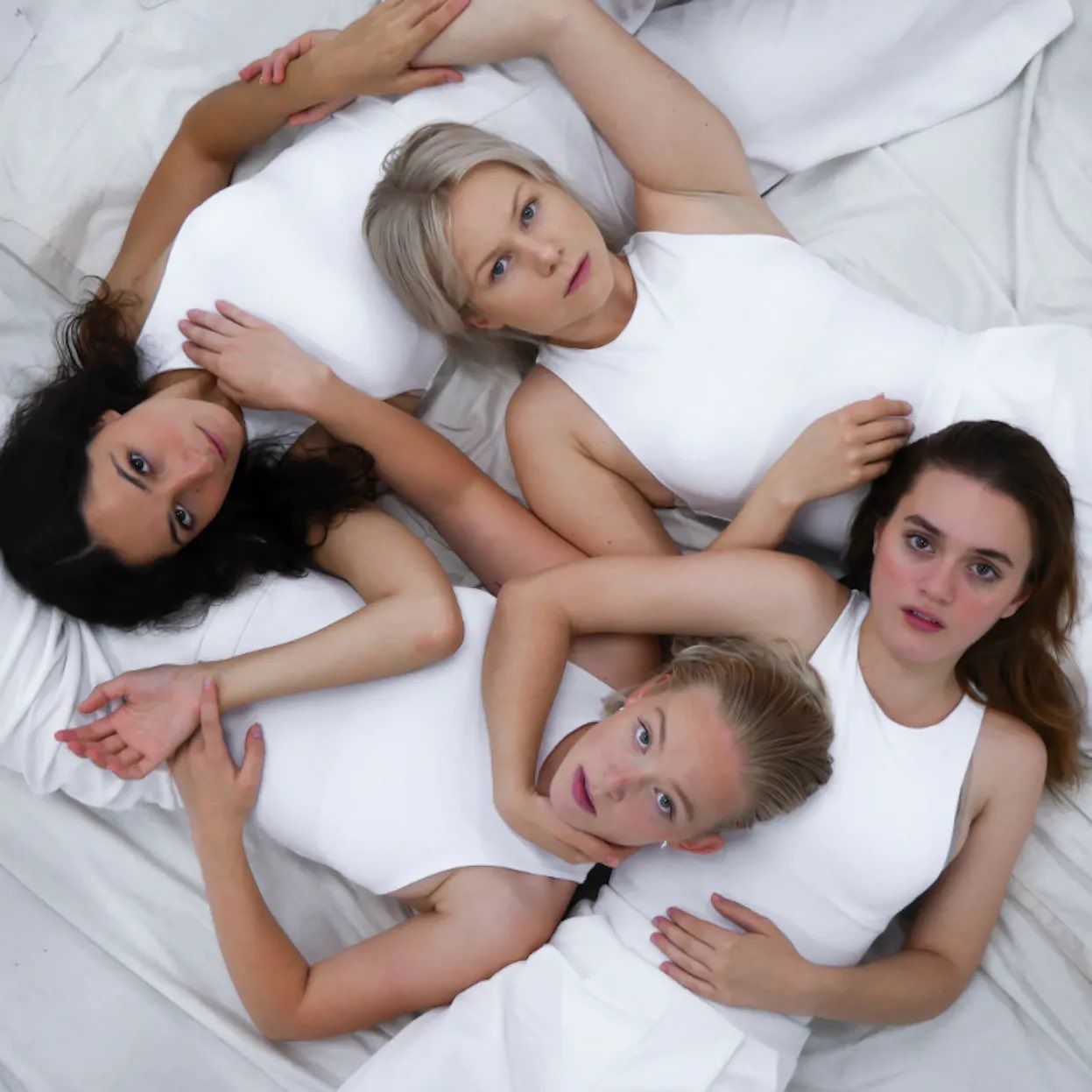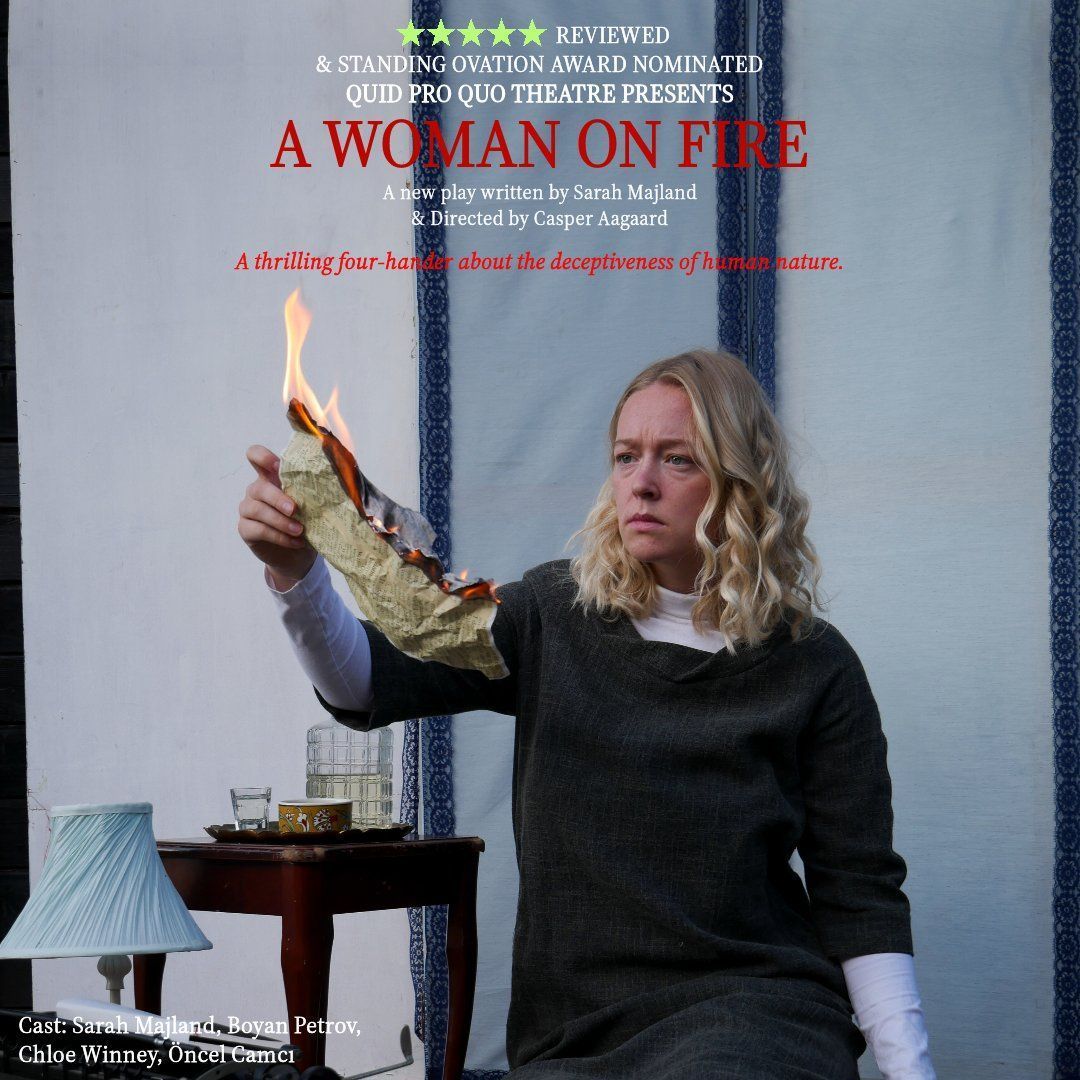INTERVIEW with Quid Pro Quo Theatre company
by John Montgomery
Quid Pro Quo Theatre company is a London-based international theatre company consisting of three creatives, Öncel Camci, Sarah Majland and Boyan Petrov, all of whom are 2023 graduates from East 15 Acting School. Their first production, A Woman Called Girl, debuted at the Camden Fringe Festival receiving a 5 star review from London Pub Theatres and being nominated for a Standing Ovation Award. Their follow up play, A Woman On Fire, arrives at Barons Court Theatre on 7th November for a four night run.
Image: Quid Pro Quo team: Öncel Camci, Sarah Majland and Boyan Petrov

Who is Quid Pro Quo theatre company?
Sarah: So we're a new company founded by three recent drama school graduates. We’re aiming to do work that is challenging, truthful and connected and that tells important stories about people and their flaws.
Boyan: Yeah, I think at the very core we are literally telling human stories. That we are somehow, all of us, inherently flawed. And that it's important for us to accept that and face it. Like, there are never characters that are just perfect and good or bad.
How did you come up with the name Quid Pro Quo?
Boyan: Besides the fact that it does sound super cool, we’re really interested in the exchange between us and the audience. We give you a part of us by being on stage and being vulnerable and trying to be as truthful as we can be in giving these raw stories and the audience gives us their attention and presence in a way of exchange so that we can make this happen.
Sarah: Yeah, there is no theatre without an audience.
Your first show, A Woman Called Girl, received a 5 star review from us during Camden Fringe. What did you learn from that experience?
Sarah: I think what we learned is that it's hard to put on the show even for a couple of nights at Camden Fringe. There's so much marketing and producing behind the whole thing. And funding! We’ve been used to having a big team behind us at school where we had free access to stage management and tech and stuff like that.
Öncel: And obviously the audience from the schools!
Sarah: Yeah, and now it's like, if you don't make it happen, nothing's going to happen. But then at the same time, there’s freedom. We can also choose exactly what we want to make here which is also really cool.
Image: A Woman Called Girl, Performed by Milja Marttila, Cristina Parracho, Chloe Winney and Sarah Majland

Tell me about your upcoming play ‘A Woman On Fire’.
Sarah: It's very different from the last one. This is more like a classic play. I would definitely categorise it as a tragedy. The story is set in the late 1950s and is the story about a woman who probably has suffered from postpartum depression but it's not something that has a name or been talked about at all. It’s about how she and her husband navigate their lives after having their first child. She is progressively getting worse and the marriage is suffering and they are not talking about what is going on between them. When we meet them in the play, the husband is almost about to leave.
Why did you decide to set the play in the 1950s?
Boyan: I play the husband. He has another whole other plot line and dilemma to deal with. He’s actually into men and not into women but that's why the 50s is actually a very good environment to see those relationships in. Because back then these things were not as discussed as they are now. That sort of suppression of your own problems and how society is pushing you to go one way but you want to go the other way and you try and be like, ‘okay, I'll just try and fit in that box’.
Öncel: So all the characters are forced to keep all of these problems a secret and it just keeps growing and growing and growing and growing and you think they're about to explode.
Sarah: Yeah, the stakes were higher back then, but it’s still something that is relatable. If we talk about postpartum depression, or sexuality and identity then it's still something that people struggle with today. It’s always interesting when you look back at something that was set seventy years ago and actually we can recognise a lot of it still.
What sort of challenges did you have by having the setting in this time period?
Boyan: We're trying our best to create the atmosphere of back then but I think most importantly we're focusing on bringing that into the acting, We're trying to incorporate that in our bodies and with how people were behaving back then. How are all of these issues that we're dealing with internally, how do they push us down and how do we deal with them?
Sarah: It’s still a story about humans that you can absolutely relate to today but there is just a slight difference in your thought process and in your mind set. Because it's like a different culture. It's a different time where there are a different set of rules in society that are so deeply ingrained.
Öncel: So the set and everything don’t matter so much because once we believe in it then it'll be real for sure.
What do you want the audience to take away from the play?
Öncel: That they should speak. That they should communicate.
Boyan: Yeah, the hardest lesson in life is to face your own demons in a way. It takes an insane amount of bravery to just face the things that bother you and that we all just want to sweep them underneath the carpet and just not look at them. The consequences could be really, really disastrous if we don't accept ourselves the way we are and move forward,
Sarah: I guess this play is not directly political…. But it is political. Everything that’s going on in the living room at home is political. It’s most definitely also like a societal political thing where there are certain things we don't talk about. For example, Boyan’s character can’t come out as gay because it’s not accepted in society, I can't admit that I'm having trouble connecting with my child because that's not accepted in society, we can't get divorced because that's not accepted in society.
Boyan and Öncel, you guys had to participate from behind the scenes in the last production. Are you excited to get on stage for this one?
Öncel: Oh, so excited. Sarah gave us a very beautiful story and that makes a difference as you wake up and know that you're going to rehearsals to say those words.
Boyan: Yeah, from an acting perspective we have such juicy scenes that the audience will see.
Öncel: Yeah, very fiery scenes.
Öncel, you composed the music for A Woman Called Girl, have you done the same for this one as well?
Öncel: Yeah, I’m trying. We're still in the middle of the rehearsal process and we're trying to figure out so many things in terms of music but yeah, absolutely, I love doing that. That's just a whole other world and it's just so fun to do that. That's another thing I can't wait for. To create what this place sounds like.
The Baron’s court theatre stage is quite a unique space. Are you looking forward to using it?
Boyan: Yes, it's great because the audience is from three sides so it will really help the play because everyone will be in it. Because it's such a small space, when you spread 50 people to be all around you then everyone is super close.
Öncel: Yeah. It's a very intimate space. They’re almost going to be like flies on the walls in our room. Like they're witnessing the secrets of this household.
Finally, what’s the next project after A Woman On Fire?
Boyan: We want to do something that’s bigger in terms of the length of run. We want to do something that’s maybe a two or three weeks run and we really want to make the next step. Financially, we still need to figure out how that could work but hopefully it’s possible. We might look at something by another writer or maybe get some other director involved that we've always wanted to work with but we want to up the scale.
Sarah: I mean, this might be sometime down the line but you've got to start planning it.






